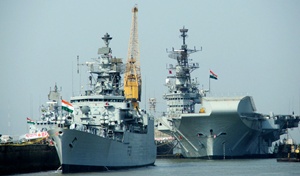Beijing paper blasts Modi govt’s ‘regional ambitions’
21 Mar 2015
India is determined to gain a dominant position in the Indian Ocean region by enhancing military and security cooperation in the area, a leading English daily in Beijing said on Friday following Prime Minister Narendra Modi's visit to Seychelles, Mauritius and Sri Lanka earlier this month.

"Now that Modi has reached out to the Indian Ocean island states, it seems India is determined to gain a dominant position in the region by enhancing military and security cooperation with them," the Global Times, known for its sharp views, stated in an article headlined "India's courtship of neighbours faces obstacles".
Saying that Modi's visit to Sri Lanka came after Colombo's decision to suspend a Chinese port project worth $1.4 billion that broke ground in September, it said Modi travelled to these island nations "mainly to counterbalance China's growing presence in the Indian Ocean".
"Regardless of the nationalist prime minister's objective, recent incidents are sufficient to merit Beijing's attention. China should follow closely the reactions of both regional powers and small states when promoting its 'One Belt and One Road' initiative, which refers to the Silk Road economic belt and the 21st century maritime Silk Road," the writer, Liu Zongyi, of the Shanghai Institutes for International Studies and a visiting fellow of Chongyang Institute for Financial Studies in Renmin University of China, said.
"India has myriad historical and cultural links with Indian Ocean island nations. New Delhi also has the ambition of playing a leading role in the region," it added.
The article pointed out that in the past decades, few Indian leaders have visited these nations and Modi was the first prime minister to embark on a Sri Lanka trip in 28 years.
"New Delhi has obviously ramped up its efforts to deepen diplomatic ties with these island countries recently, which reflects that India now boasts a strong sense of sphere of influence. South Asia and the Indian Ocean are viewed as India's territory, where other countries cannot get involved," Liu wrote.
According to the article, the One Belt and One Road initiative envisioned by Chinese President Xi Jinping has been hailed by most South Asian and Indian Ocean countries, but the Indian government believed that there must be some ulterior geopolitical purposes behind it.
"New Delhi doesn't want countries in South Asia and the Indian Ocean to participate in the programme, but it is unable to propose a substitute," it stated.
Regarding Modi's visit to Sri Lanka its said that historical disputes between New Delhi and Colombo over the Tamil people and fishery resources "would make it difficult for the two sides to build a rapport any time soon".
"Modi included in his Sri Lanka trip the city of Jaffna in the Tamil-majority Northern Province, which in fact shows India's interference in the country's internal affairs," Liu wrote.
The article then referred to Sino-Sri Lankan ties which it stated went back a long way.
"Beijing provided help and support for the nation (of Sri Lanka) during its 26-year civil war with the Liberation Tigers of Tamil Eelam, an independent militant organization also known as the Tamil Tigers. And save for China, no other country was willing to help Colombo then," it stated adding that while some states hampered Colombo's efforts to resume domestic order over ths issue of human rights, Beijing again offered assistance for postwar healing.
"If the Sri Lankan government ignores China's goodwill in a bid to cater to certain powers, it will hardly gain respect from the international community," it stated.
According to Liu, every small country yearns to strike a balance among different powers and some even attempt to "maximise their national interests by taking advantage of the competition among great powers".
"China put forward the 'One Belt and One Road' project to resolve contradictions and conflicts in regional economy and social development instead of creating feuds. Beijing should respect their attitude by further negotiating with countries along the routes and discuss with them the rationality and feasibility of specific projects," it concluded.



















